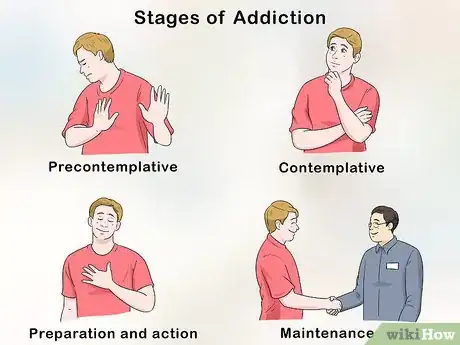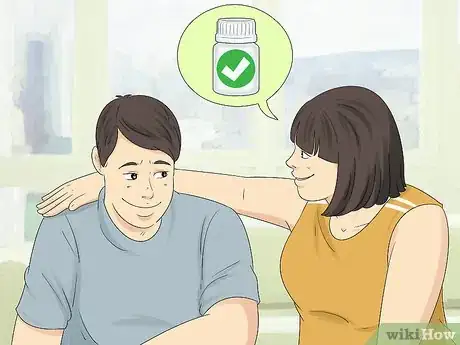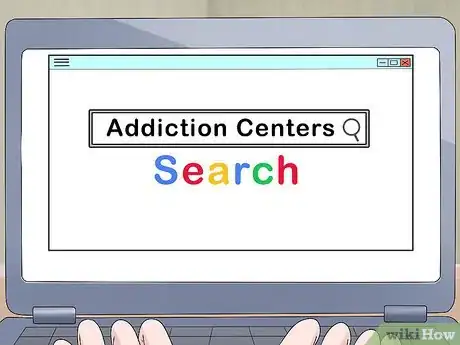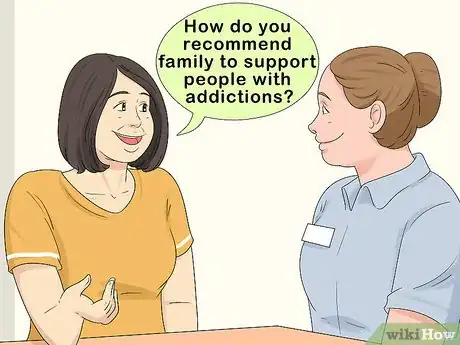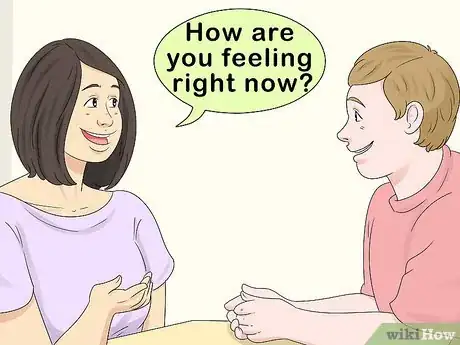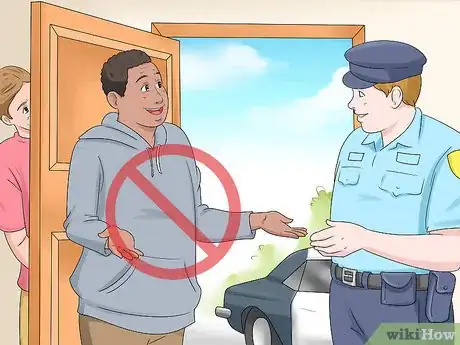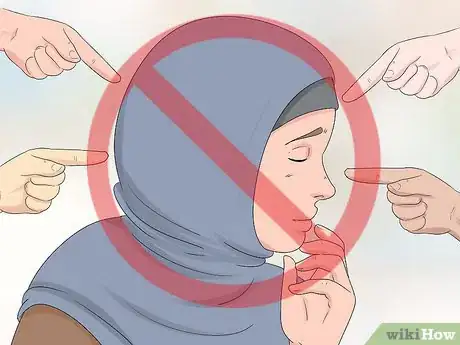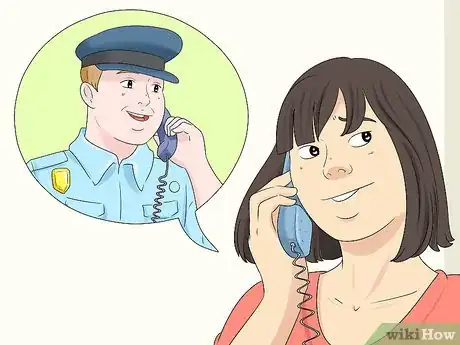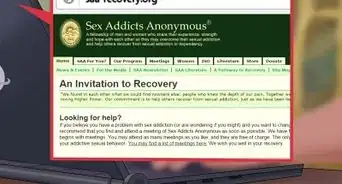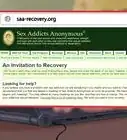This article was co-authored by Trudi Griffin, LPC, MS. Trudi Griffin is a Licensed Professional Counselor in Wisconsin specializing in Addictions and Mental Health. She provides therapy to people who struggle with addictions, mental health, and trauma in community health settings and private practice. She received her MS in Clinical Mental Health Counseling from Marquette University in 2011.
This article has been viewed 12,698 times.
Helping someone struggling with addiction, no matter what the root problem is (drugs, alcohol, gambling, sex, internet usage, or something else), takes care and commitment. The number-one priority typically is to connect the person with a treatment program, but this can take some convincing depending on the stage of their addiction. A person with an addiction will also need continued emotional support during recovery, which you can provide by holding them accountable, pitching in with day-to-day needs, and just lending a friendly ear. However, you also need to make sure you protect your own health and well-being -- which can sometimes mean contacting the authorities or ending the relationship.
Steps
Helping Them Find Treatment
-
1Determine what stage their addiction is at. Whether or not the person recognizes their addiction and is willing to get help depends on the stage of addiction. At certain stages, the person may be unwilling to undergo treatment, but in other stages, treatment may be more effective.
- Pre-contemplative stage: They may not acknowledge their problem, its consequences, or the impact it has on others. It is best to provide information about the negative consequences of their addiction and talk to them about how it is holding them back from their goals. Even if they are forced into treatment, treatment may not be effective.
- Contemplative stage: They may start realizing how their addiction affects them. They may still hesitate to admit their addiction. You can start gently encouraging them to get treatment. An intervention with loved ones may be effective.
- Preparation and action: They may be ready to make changes in their life. They may want to end their addiction, but they may still be struggling. At this stage, they need encouragement and support.
- Maintenance: They have made changes to end their addiction or they may have ended the behavior. To prevent a relapse, they need encouragement and support.
-
2Talk about how treatment programs are safe and have a solid success rate. The success rates for various addiction treatment programs are hard to pin down, and it's easy to find critical views that say they "don't work" or are "useless" in battling addiction. But, you can point out that the general success rate is in line with those for chronic medical conditions like diabetes, asthma, and high blood pressure.[1]
- If they're scared because their addiction involves some kind of illegal activity, remind them that there are laws (in the U.S. and elsewhere) that protect people seeking treatment.
Advertisement -
3Convince them to see a doctor. A person suffering from addiction might resist or be scared of going to a rehab center, especially if they are in denial. If so, tell them to see a doctor instead, just as a health check. Remind them that things they discuss with a doctor are confidential, so they can be honest without fear.
- A doctor can provide mental health resources as well as prescriptions to manage withdrawal symptoms and cravings.
- Even if physical changes aren't immediately apparent, substance abuse does have a physical effect on a person's health.
-
4Ease their fears about detox. Some addicts might fear the physical and mental effects of detox, which can be intense. If so, remind them there are medications and professionals to help them, if they go to a treatment center.
-
5Discuss ways to take care of treatment costs. Encourage the person to talk to treatment centers about payment options. In some cases, health insurance will cover addiction treatment. Many states and charitable organizations also help foot the bill. If they are willing to seek treatment, there's probably a way to pay for it.
- You can do some of the research for them. Contact treatment centers in your area. Call their insurer (if you know who it is) and ask about their general policies regarding addiction treatment. Look up government and charitable programs in your area.
- You can search online for U.S. treatment centers at https://findtreatment.samhsa.gov/.
-
6Suggest therapy if they don't want to go to rehab. Cognitive Behavioral Therapy (CBT) and motivational interviewing are two kinds of talk therapies that can help combat addictions. Contingency management is another type of therapeutic program (offering incentives to stay off drugs).[2]
- These types of therapy programs should always be done under the guidance of a licensed mental health professional. The person's doctor can provide a referral to a therapist.
-
7Do the research on addiction centers for your friend. Just deciding to seek treatment in the first place can be hard enough for an addict. Help them by finding out whatever you can about treatment centers by visiting, calling, or searching their websites. Find out:
- Where is the facility located? Is it a convenient or preferable location?
- What is the center's approach? Is it medical, therapeutic, or some combination? Does it offer any spiritual guidance?
- Does the center's approach incorporate a 12-step or similar support program?
- How does the center operate (inpatient or outpatient)?
- Is its program tailored to each individual?
- Does the center adapt treatment as the addict's needs change?
- How long does the program last? There is no single correct answer here, but longer is nearly always better when it comes to addiction treatment programs.
- What is aftercare like? Try to find a program that offers outpatient care after the person has left.
-
8Stage an intervention only if you are fully prepared. Holding an intervention is a stereotypical way to help an addict. However, experts now believe that it is much more helpful to offer incentives and focus on well-being than to "shock" them into seeking treatment. Some believe that interventions can do more harm than good. If you do want to try an intervention:[3]
- Consult a professional addiction counselor first.
- Make sure friends and family are on board with the idea.
- Wait until the person is not under the influence to hold the intervention.
- Stay calm and be nonjudgmental.
- Avoid using the term “addict.”
- List specific incidents and examples of issues caused by the addiction.
- Use “I” rather than “you” statements (“I am concerned for your well-being” rather than “You are ruining your life”).
- Be prepared for the person to push back against your claims.
- Be ready to suggest concrete means of support, such as treatment centers and counselors.
Lending Support During Their Recovery
-
1Talk to their treatment program or therapist about ways you can help. A person with an addiction may need your help during treatment, not just before it. Ask the treatment center if it would be helpful for you to visit the person with the addiction during treatment, for instance. Or, ask their therapist for ideas about how you can continue to support the person moving forward (making sure they go to group therapy meetings, for instance).
- Remember that the treatment center or therapist cannot release any information about your loved one unless they have written permission from the patient. You can ask general questions like "do you encourage people to visit your patients?" or "how do you recommend family to support people with addictions?"
-
2Help out with the little things during recovery. The addict's main focus during recovery will be on themselves. Make sure that their daily lives run as smoothly as possible by taking care of things like chores, grocery runs, babysitting, etc.[4]
-
3Ask how they are feeling. Recovery can be a long, hard road with lots of hurdles along the way. Stopping to ask the person how they are feeling gives them a chance to decompress, and lets them know that you are someone who cares about them and wants them to do well. This little gesture can mean a lot.[5]
-
4Work through relapses. Recovery doesn't always move in a straight line. If the person you are trying to help slips up and falls back on old behaviors (willingly or not), this doesn't mean it's time to give up on them. Continue supporting them by focusing on the future and celebrating their successes.[6]
- Talk about "when" they'll get back on treatment, rather than "if" they will.
- For instance: "When you get back to finish your treatment program, we'll finally be able to take that road trip to Yellowstone!"
-
5Take care of yourself during recovery. Being a caretaker can be mentally and physically draining. Make sure that you're getting enough rest and practicing good self care. If you start to feel unwell, see a doctor, counsellor, or spiritual mentor so that you can get the help you need in order to help the person.[7]
Protecting Yourself if They Won't Seek Treatment
-
1Establish boundaries with the person. As much as you may love this person, remember that it is not your responsibility to fix them. You can encourage them to get treatment, but if they refuse to help themselves, do not take on their burdens for them. You should allow them face the consequences of their actions. Create distance between you if necessary.
- If this person is a family member or close friend, remember that you will need to commit to them for the long haul if you want to help them. Determine ahead of time what you are and are not willing to do for them.
- If this person is an acquaintance, coworker, or distant friend, you may want to create stronger boundaries. Tell them what you have noticed about their addiction and behavior, but do not interfere too much.
-
2Don't take foolish risks to “help” them. Don't cover up for someone with an addiction, hide or throw out drugs, or excuse their dangerous behavior. You're encouraging their addiction and hindering their recovery by "helping" in these kinds of ways. And, if you get in trouble for doing something illegal (e.g., stashing their drugs), you won't be able to help the person either.[8]
-
3Avoid self-blame. You are not the “cause” of their addiction, no matter what they say or how you sometimes feel. Let the person with the addiction take responsibility for their problem. This is an important step in recovery.[9]
- If they blame you ("I started drinking because of how you ignored me!"), be compassionate but firm: "I'm sorry I haven't always been there for you, but you chose to go down this path, and now I'm choosing to help you the best I can."
-
4Cut ties if the situation becomes out of control. Someone with an addiction must ultimately accept responsibility for their own recovery. If you try and try to help a person with an addiction but they refuse treatment, make sure your own health and safety are protected. You may have to separate yourself from them if they become violent or dangerous, or put you in risky situations.
- If, for instance, they physically threaten you or you feel at risk of physical harm, call the police.
- Or, if they simply refuse to seek help despite your repeated efforts, you may have to say "I'm sorry, but I just can't handle watching you destroy yourself any longer, so we're going to have to go our separate ways."
Expert Q&A
-
QuestionHow do you support someone in recovery?
 Lauren Urban, LCSWLauren Urban is a licensed psychotherapist in Brooklyn, New York, with over 13 years of therapy experience working with children, families, couples, and individuals. She received her Masters in Social Work from Hunter College in 2006, and specializes in working with the LGBTQIA community and with clients in recovery or considering recovery for drug and alcohol use.
Lauren Urban, LCSWLauren Urban is a licensed psychotherapist in Brooklyn, New York, with over 13 years of therapy experience working with children, families, couples, and individuals. She received her Masters in Social Work from Hunter College in 2006, and specializes in working with the LGBTQIA community and with clients in recovery or considering recovery for drug and alcohol use.
Licensed Psychotherapist Help them any way you can. Go with them to meetings if they ask you to come, offer rides or bus fare to their meetings or therapy sessions, and praise them for being consistent and sticking to their goals. If the person relapses or quits, encourage them to get back into recovery. Keep in mind, it is not your job to manage someone else's recovery. If they refuse your help, you can't force them to do the right thing.
Help them any way you can. Go with them to meetings if they ask you to come, offer rides or bus fare to their meetings or therapy sessions, and praise them for being consistent and sticking to their goals. If the person relapses or quits, encourage them to get back into recovery. Keep in mind, it is not your job to manage someone else's recovery. If they refuse your help, you can't force them to do the right thing.
References
- ↑ https://www.drugabuse.gov/publications/principles-drug-addiction-treatment-research-based-guide-third-edition/frequently-asked-questions/how-effective-drug-addiction-treatment
- ↑ http://www.apa.org/monitor/2013/06/addiction.aspx
- ↑ https://www.mayoclinic.org/diseases-conditions/mental-illness/in-depth/intervention/art-20047451
- ↑ https://www.cancer.org/healthy/stay-away-from-tobacco/helping-a-smoker-quit.html
- ↑ https://www.cancer.org/healthy/stay-away-from-tobacco/helping-a-smoker-quit.html
- ↑ https://www.psychologytoday.com/us/blog/the-compassion-chronicles/201610/how-compassion-can-help-you-support-addicted-loved-one
- ↑ https://www.psychologytoday.com/us/blog/the-compassion-chronicles/201610/how-compassion-can-help-you-support-addicted-loved-one
- ↑ https://www.helpguide.org/articles/addictions/drug-abuse-and-addiction.htm
- ↑ https://www.helpguide.org/articles/addictions/drug-abuse-and-addiction.htm
